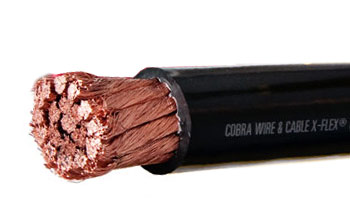
When connecting a battery to a starter or similar electrical system, you’ll typically need a cable. You shouldn’t use just any cable, though. For a safe and secure connection, you should use a battery cable. Battery cables are conductors that are designed for batteries. Below are five things you need to know about battery cables.
#1) Thicker Than Other Cables
You can often distinguish battery cables from other types of cables by inspecting their thickness. Battery cables are thicker than their counterparts. They have a lower American Wire Gauge (AWG) number, meaning battery cables are thicker than other cables with a higher AWG number. The thick construction of battery cables allows them to carry more electricity.
#2) Supports Indoor and Outdoor Applications
Not all battery cables are used indoors. Most of them support indoor and outdoor applications. They feature a heavy-duty jacket that protects the enclosed conductors from environmental damage. Even when used outdoors, battery cables will continue to provide a conductive pathway between batteries and electrical systems.
#3) Made of Solid Copper
Battery cables are typically made of solid copper. Copper is one of the most conductive metals on the planet. The only metal that’s more conductive, in fact, is silver. Therefore, most battery cables are made of solid copper.
They aren’t made of solid aluminum, nor are they made of copper-clad aluminum. Battery cables are typically made of strands of braided, solid copper. The solid copper design of battery cables allows for maximum conductivity while also protecting them from damage. There are different types of battery cables, but nearly all of them are made of solid copper with an outer jacket.
#4) Not Exclusive to Batteries
Some people assume that battery cables are used exclusively to connect batteries to a starter or electrical system. While they are commonly used for battery-related applications such as this, battery cables are used for other purposes. Depending on the particular type, battery cables may be used to connect transformers, or they may be used to connect switchboard panels or electronic meters. Regardless, they aren’t exclusive to batteries.
#5) Different From Welding Cables
While they share some similar characteristics, battery cables are different from welding cables. Welding cables are used in welding machines. Welding machines feature an electrode, which must be powered to produce an arc. Welding cables provide the necessary power from a source. Battery cables aren’t used in welding machines. They are used in battery applications as well as certain non-battery applications.

